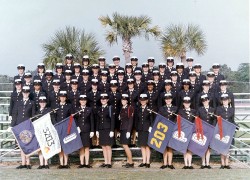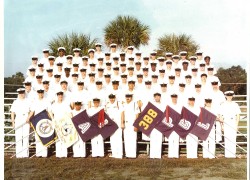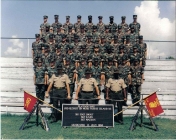The special operations communications sergeant employs conventional and unconventional warfare tactics and techniques in communications. Trains and maintains proficiency in all Major Duties- Organizes, trains, advises and supervises indigenous and allied personnel in the installation, utilization and operation of radio equipment, radio nets, standard and expedient antenna systems and wire communications.
18D1O - Skill Level One




An 18X is a high quality Special Forces candidate that is recruited off-the-street rather than from within the Army. Following successful Infantry and Airborne training and subsequent Special Forces training, the 18X recruit is awarded the Special Forces Tab and an 18-series Military Occupational Specialty (MOS).
18D2O - Skill Level Two

In Service Special Forces Recruit: The Special Forces Pipeline requires a commitment of 1 year (2 years for 18Ds) of intensive coursework based on the Soldier's military specialty training. A Soldier is awarded the green beret and the Special Forces Tab at the end of all phases of training. The six phases include: Phase IA – Special Forces Assessment and Selection Conditioning Course Phase IB – Special Forces Assessment and Selection *Special Forces Preparation Course Phase II – Small Unit Tactics/SERE/PG/HD *Common Leadership Training Phase III – Military Occupational Specialty (MOS) Specific Training Phase IV – Language Training Phase V – Unconventional Warfare Culmination Exercise (Robin Sage) Phase VI – Graduation (Award of the Green Beret and SF tab)
18D3O - Skill Level Three

Special Forces Junior Communications Sergeant: Employs conventional and unconventional warfare tactics and techniques in communications. Trains and maintains proficiency in all major duties. Organizes, trains, advises and supervises indigenous and allied personnel in the installation, utilization and operation of radio equipment, radio nets, standard and expedient antenna systems and wire communications. Proficient in and the instruction of the installation, operation and employment. FM, AM, VHF, UHF, and SHF radio communication systems to transmit and receive radio messages in voice, continuous wave (CW), and burst code radio nets. Responsible for the establishment and maintenance of detachment tactical and operational communications equipment. Plans, prepares and assists in the communications targets of the area study, prepares and assists in briefings, brief-backs and debriefings. Supervises the communications functions when in split detachment configuration for special operations or missions. Conducts C-E duties when task-organized in preparation (isolation) for missions and during operations, and advises the detachment commander on all communications matters.
18D4O - Skill Level Four

Special Forces Senior Communications Sergeant: Employs conventional and unconventional warfare tactics and techniques in communications. Performs all duties of preceding skill level. Advises and provides tactical and technical guidance to the detachment commander, indigenous and allied personnel. Responsible for the planning, execution and planning of cross training of detachment members in Special Forces communications skills. Prepares the communications electronics portion of operations orders, area studies and area assessments. When directed, conducts operational and intelligence in the planning, preparation and execution of detachment missions. Serves at SF battalion or higher level as frequency manager.
18D5O Skill Level Five

Special Forces Team Sergeant: Major Duties: Supervises, instructs and serves as the senior enlisted member for SF activities. Trains and maintains proficiency in all major duties associated with Special Forces. Perform administrative, operational and training duties during tasks organization of the Operational Detachment Alfa or Bravo (ODA or ODB) during mission preparation (isolation) and operations. Performs joint, combined and coalition planning and supervises operations for higher headquarters, major commands and joint commands. Performs the duties of senior leadership, staff, and training functions within Special Forces.
Special Forces Senior Sergeant: Major Duties: The Team Sergeant is the senior NCO of the Special Forces Operational Detachment Alpha/SMU Team responsible for all administrative, operational, and training requirements of the detachment in peacetime and war; supervises all aspects of mission preparation (isolation) and execution. CMF 18 Master Sergeants are the “subject matter experts” in ARSOF, capable of planning and executing conventional and unconventional combat operations across the spectrum of conflict in support of theatre level objectives in a unilateral, joint, interagency, multi-national, combined, or coalition environment. Performs duties associated with SQI 8, M and P.
Special Forces Senior Sergeant: Major Duties: The Team Sergeant is the senior NCO of the Special Forces Operational Detachment Alpha/SMU Team responsible for all administrative, operational, and training requirements of the detachment in peacetime and war; supervises all aspects of mission preparation (isolation) and execution. CMF 18 Master Sergeants are the “subject matter experts” in ARSOF, capable of planning and executing conventional and unconventional combat operations across the spectrum of conflict in support of theatre level objectives in a unilateral, joint, interagency, multi-national, combined, or coalition environment. Performs duties associated with SQI 8, M and P.
School Information
School: 331 School Location: FT BRAGG, NC
Course: 011-18E30 Phase:
Course Title: SF QUAL (SF COMMUNICATIONS SGT)
FY: 2008 School: 331 Course: 011-18E30 Phase: Course Length: 48 Weeks 0.0 Days
Verifiable Prerequisites
There are no Prerequisites in the Verifiable Prerequisites section. See other sections.
Prerequisite Courses
There are no Prerequisite Courses.
Text Prerequisites
Be a graduate of the Special Forces Assessment and Selection Course (SFAS). Pass a 50-meter swim test, unassisted, wearing fatigues and combat boots. Soldiers who do not have a current DA 330 with a 1/1/1 must complete Language Modules received after SFAS (Modules 1 thru 4) prior to starting the SFQC. Must possess a minimum an interim SECRET security clearance. Any variation from the above standards requires a waiver from the CG, USAJFKSWCS.
Course Scope:
Special Forces small unit tactics; weapons marksmanship; air operations; SF common tasks; military operations in urban terrain; combatives; MOS 18E training; Common Leaders Training (CLT); language training; Instructor Training Course (ITC); cross cultural communications and awareness; Survival, Evasion, Resistance, Escape (SERE); special operations, mission
planning; advanced special operations (ASO), and unconventional warfare practical exercise; and culmination exercise. This course consists of the following modules: Module 1: (Individual Training): Special Forces small unit tactics; weapons marksmanship; air operations; SF common tasks; military operations in urban terrain; combatives; and cultural awareness.
Module 2: (SERE): Survival, evasion, resistance, and escape. Module 3: (MOS Training 18E): Computer applications, communications systems, procedures, planning, operations, and field training exercise. Module 4: (Language Training): Language training in the 10 core designated languages. Module 5: (Collective Training): Special operations, mission planning; advanced special operations (ASO), and unconventional warfare practical exercise; and culmination exercise.
Special Information:
Report to Special Forces Qualification Course (SFQC) with the following documents:
a. Current DD 2808 (Report of Medical Examination) and current DD 2807-1 (Report of Medical History). Physical must remain valid until after graduation from SFQC. NOTE: For Special Forces Candidates, who meet medical standards to admission to SFAS/SFQC and complete SERE in conjunction with SFQC will remain current providing a normal EKG and a satisfactory urinalysis test were documented within two years of the class start date.
b . Official Medical Records.
c. Special Forces Assessment and Selection (SFAS) certificate.
d. DA Form 705 (APFT Scorecard) scored within the last 6 months.
e. DA Form 1307 (Individual Jump Record).
f. Current SECRET security clearance or a completed EPSQ. NOTE: Losing unit will not prevent a Soldier from attending the SFQC if his Security Clearance is not finalized. 1 st SWTG (A) will process his ESPQ and grant an interim SECRET security clearance upon his arrival.
g. Must have a Defense Language Aptitude Battery Score.
h. SERE: Any abnormalities will contain a written evaluation by the appropriate medical specialists.
Successful completion of the Special Forces Qualification Course results in the award of MOS 18E.
All waiver requests will be sent to CG, USAJFKSWCS ATTN: AOJK-OP (G3) FT Bragg, NC 28310 NL T 45 days prior to the class start date.
Course: 011-18E30 Phase:
Course Title: SF QUAL (SF COMMUNICATIONS SGT)
FY: 2008 School: 331 Course: 011-18E30 Phase: Course Length: 48 Weeks 0.0 Days
Verifiable Prerequisites
There are no Prerequisites in the Verifiable Prerequisites section. See other sections.
Prerequisite Courses
There are no Prerequisite Courses.
Text Prerequisites
Be a graduate of the Special Forces Assessment and Selection Course (SFAS). Pass a 50-meter swim test, unassisted, wearing fatigues and combat boots. Soldiers who do not have a current DA 330 with a 1/1/1 must complete Language Modules received after SFAS (Modules 1 thru 4) prior to starting the SFQC. Must possess a minimum an interim SECRET security clearance. Any variation from the above standards requires a waiver from the CG, USAJFKSWCS.
Course Scope:
Special Forces small unit tactics; weapons marksmanship; air operations; SF common tasks; military operations in urban terrain; combatives; MOS 18E training; Common Leaders Training (CLT); language training; Instructor Training Course (ITC); cross cultural communications and awareness; Survival, Evasion, Resistance, Escape (SERE); special operations, mission
planning; advanced special operations (ASO), and unconventional warfare practical exercise; and culmination exercise. This course consists of the following modules: Module 1: (Individual Training): Special Forces small unit tactics; weapons marksmanship; air operations; SF common tasks; military operations in urban terrain; combatives; and cultural awareness.
Module 2: (SERE): Survival, evasion, resistance, and escape. Module 3: (MOS Training 18E): Computer applications, communications systems, procedures, planning, operations, and field training exercise. Module 4: (Language Training): Language training in the 10 core designated languages. Module 5: (Collective Training): Special operations, mission planning; advanced special operations (ASO), and unconventional warfare practical exercise; and culmination exercise.
Special Information:
Report to Special Forces Qualification Course (SFQC) with the following documents:
a. Current DD 2808 (Report of Medical Examination) and current DD 2807-1 (Report of Medical History). Physical must remain valid until after graduation from SFQC. NOTE: For Special Forces Candidates, who meet medical standards to admission to SFAS/SFQC and complete SERE in conjunction with SFQC will remain current providing a normal EKG and a satisfactory urinalysis test were documented within two years of the class start date.
b . Official Medical Records.
c. Special Forces Assessment and Selection (SFAS) certificate.
d. DA Form 705 (APFT Scorecard) scored within the last 6 months.
e. DA Form 1307 (Individual Jump Record).
f. Current SECRET security clearance or a completed EPSQ. NOTE: Losing unit will not prevent a Soldier from attending the SFQC if his Security Clearance is not finalized. 1 st SWTG (A) will process his ESPQ and grant an interim SECRET security clearance upon his arrival.
g. Must have a Defense Language Aptitude Battery Score.
h. SERE: Any abnormalities will contain a written evaluation by the appropriate medical specialists.
Successful completion of the Special Forces Qualification Course results in the award of MOS 18E.
All waiver requests will be sent to CG, USAJFKSWCS ATTN: AOJK-OP (G3) FT Bragg, NC 28310 NL T 45 days prior to the class start date.




